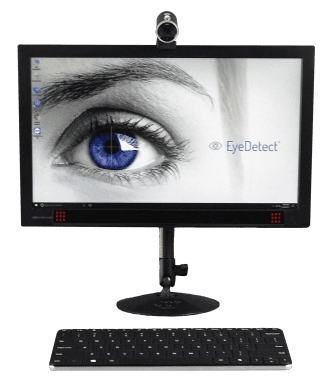
The Most Accurate Lie Detector Available
Get 86% accuracy in just 30 minutes.
EyeDetect® is a next-generation lie detector. It measures subtle changes in the eye to detect deception.
EyeDetect is used to screen job applicants, employees, parolees, and immigrants — as well as law enforcement and public safety personnel — to protect against corruption and crime.
How Does EyeDetect Work?
The brain and eyes respond to deception. The greater the consequences of the lie, the greater the cognitive load. This affects the eyes. EyeDetect measures changes in pupil diameter, eye movement, reading behavior, blinks, fixations and other things.
Using an infrared camera and complex algorithm, a person’s credibility score is calculated: truthful or deceptive.
Participants answer True/False questions on a computer. The infrared camera records eye behaviors.
When the test concludes, responses to questions and eye measurements are uploaded to a web server for immediate scoring.
Those authorized can view results in the web-based Converus Dashboard. A Converus Credibility Score shows the probability the person was truthful.

Features and Benefits
Highly Accurate
Studies show that EyeDetect has an average accuracy of 86%.
Fast Results
Tests take 30 minutes and reports are ready in 5. Reports include a credibility score and details showing participants’ responses to questions.
Nonintrusive
No sensors are attached to the participant, who answers True/False questions on a computer.
Economical
Test administrators are trained in 2 hours and can manage up to 3 EyeDetect stations simultaneously.
Simple to Use
The participant follows onscreen instructions. A practice session helps to get comfortable with the test.
Scalable
During an average eight-hour workday, test proctors with three stations can run about 30 tests daily. EyeDetect can quickly screen many people with great results.
Incorruptible & Unbiased
Participants are tested by computer. The test administrator cannot alter test results. Test data is encrypted and tamper-proof.
Bank-Level Security
EyeDetect uses encryption and physical security that banks use. Data are encrypted and stored using military grade 256-bit AES / CBC mode encryption.
Complete Analytics & Reporting
Those authorized access test results via web browser. Results can be sorted by date, department, test type, credibility score, and more.
Flexible & Portable
One or more systems can be used at a time. The system is portable and can be carried to a regional or remote office for testing.
What's Included

Read More
Many Types of EyeDetect® Tests
Customers have access to all available tests created by Converus. There are pre-employment tests, tests for ongoing evaluations, sex offender tests and many more. New EyeDetect tests are created daily and can be requested when needed.
Tests are available in many languages.
After the test, the examinee’s test responses and corresponding eye behavior is securely analyzed by algorithm and stored on a secure cloud server.
A detailed report is created with a Credibility Score, which indicates the probability that the individual was truthful or deceptive. Only authorized personnel can access the report.
Stealing
Stealing money, products or equipment for personal use or resale.
Serious Crimes
Commission of serious crimes,
whether caught or not.
Confidential Information
Revealing confidential company information to unauthorized persons.
Drug Trafficking
Involved in manufacturing, transporting or distributing illegal drugs.
Documentation Fraud
Illegally altering or modifying documents.
Unauthorized Transactions
Irregularities in financial services transactions.
Urinalysis
Discover a history of drug use instead of recent drug detection
Drug Use
Use of illegal drugs.
Bribes
Offering or accepting bribes (money, gifts, favors or other benefits or kickbacks) or any form of unauthorized and undisclosed financial benefit.
Ties to Criminal Groups
Having ties to criminal groups such as organized crime, cartels or gangs.
Terrorism
Having ties to terrorist organizations.
Cyber Crimes
Electronic vandalism or sabotage such as email scams or viruses.
Fuel Theft
Stealing fuel from company vehicles.
Identity Theft
Stealing/selling the identity or financial resources of other individuals.

